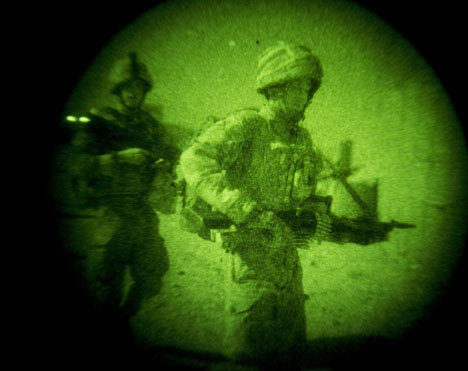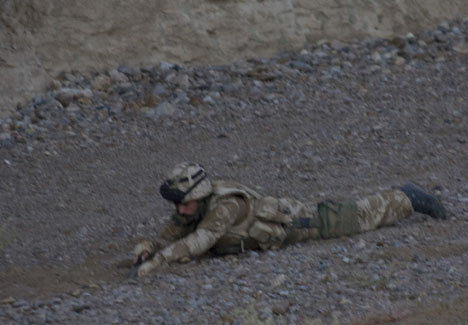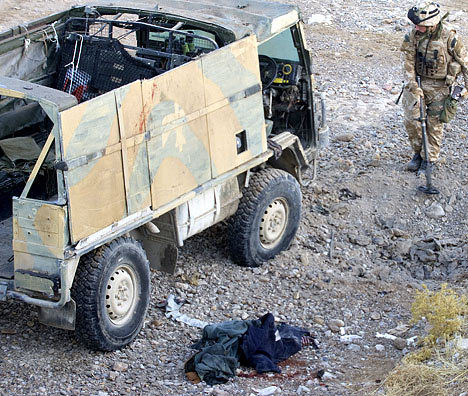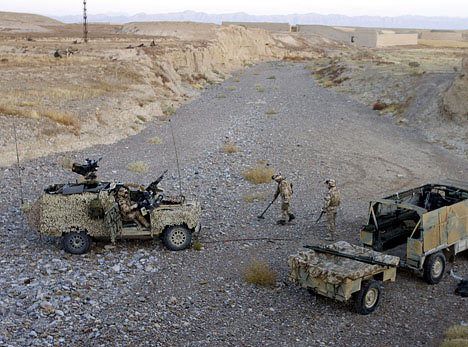The struggle and the danger go on and on
We are out on our last night patrol with the Royal Marines, and about to receive a bleak reminder of the risks and dangers British forces face on the ground in Afghanistan.
It is 5am and we have been on the move for almost two hours, a large force of Marines from 40 Commando and Afghan National Army soldiers advancing in silence across the moonlit plain to the north of Kajaki Dam.
We are nearing our objective, and about to cross the last piece of open ground under cover of darkness, ready to take cover and assault our target compound in Taliban territory at first light.
Without warning, the loud thump of an explosion rolls across the plain, from somewhere close by to our left.
There are whispered discussions over what the explosion may have been. Possibly the sound of artillery miles away, one Marine suggests hopefully?
No, his colleagues insist. It was too close.
'I'm hoping nobody's going to tell me someone's stepped on a mine or an IED [improvised explosive device]', says Sergeant Dominic 'Dozza' Conway, of 7 Troop, Charlie Company.
His radio earpiece chatters into life, and Dozza's worst fears are confirmed. A minestrike. There are at least two casualties, one of them in Category 1 - critical.
The Incident Response Team [IRT] casualty evacuation helicopter has already been requested from Camp Bastion, some 50 miles away.
As we wait for more information the more experienced Marines are already predicting the mission will have to be aborted, or ****-canned, as they put it.
The explosion means any hope of surprise is gone. Intelligence has already indicated that the Taliban heard the blast, the commander has alerted his troops, promised them reinforcements and talked of moving rockets forward to attack the IRT helicopter if it appears.
With Charlie Company's medics busy dealing with the casualties the Officer Commanding, Major Duncan Manning, will think twice before moving more troops forward towards a prepared enemy.
Sunrise is in one hour, and by the time the casualties are on the helicopter it will be daylight, making an advance across open ground highly risky.
Sure enough, 7 Troop is ordered to collapse its perimeter and move a few hundred yards west to help the recovery operation.

A Royal Marine Commando on patrol in the early hours as seen through night vision goggles.
By 5.45am the sky is growing paler over the mountains to the east. It will soon by light enough for the Taliban to fight, and 7 troop is still dangerously exposed.
Two Army Air Corps Apache helicopter gunships are circling overhead, and behind us we can hear the distinctive heavy thud of a Chinook helicopter's rotors, arriving to evacuate the two casualties.
The IRT helicopter is on constant stand-by at Camp Bastion and carries a surgeon, anaesthetist and nurses to start treating casualties in the air.
Intelligence indicates that the Taliban have advanced to our north west, and as the sun rises we advance north up a deep wadi towards the scene of the explosion.
Over the radio we are told that the patrol's Rules of Engagement, which set out when they can open fire, have been upgraded due to the higher imminent threat.
We reach the scene.
It seems an Afghan interpreter stepped on a buried mine while standing just beside the driver's seat of an open-topped Pinzgauer truck, used as the patrol's medical vehicle.
The ground had already been searched minutes earlier with metal detectors, but for some reason the mine was not spotted. It was placed with careful thought - just at the junction of the main wadi and a narrow tributary - an obvious point for a soldier to walk.
The interpreter suffered terrible injuries, losing both legs and suffering a heart attack. The medics got his heart going again, and struggled to stabilise his condition.
The Pinzgauer is damaged and cannot move. Blood is smeared along one side.
There is deep crater by the front wheel, just three feet from where the Royal Marine driver was sitting. Astonishingly his injuries were minor.
The doctor sitting in the back was thrown across the cabin, but is not seriously hurt.
To complicate matters there is now a serious risk of more mines, and the trailer behind the Pinzgauer is full of demolition explosives, ammunition and mortar bombs.
The Marines could 'deny' the Pinzgauer - or destroy it - using their own heavy weapons or calling in an airstrike from an Apache, but the ammunition would create a massive blast, and the vehicle appears to be repairable.
Royal Marine Matt Girling, one of 7 Troop's two specialist assault engineers, volunteers to go forward with a metal detector to clear a safe path. It is his first 'live' mine clearance task. Soon he is lying on his front probing the ground ahead with a narrow spike.
'That's one lonely job,' chuckles the CSM, standing with us on the lip of the wadi a few feet above he vehicle - far too close, when we think about it, to be watching a mine clearance operation next to a large stack of ammunition.

Marine Girling probes the ground with his commando knife, looking for more I.E.D's. 'No pressure, Royal,' he yells down at Marine Girling. His quip eases the tension a notch.
Suddenly the camp's faithful dog Tangye - a stray who has adopted the Marines and accompanies them on every patrol - trots forward cheerfully to see what all the fuss is about, sniffing the ground as he wanders into the minefield.
Before anyone can stop him he is just a few feet from Marine Matt Dirling.
The CSM has stopped smiling and is screaming at the Marine: 'Stand still, mate.'
The Sergeant Major and his colleagues try desperately to turn the dog back, whistling and gesticulating. One Marine half raises his rifle towards the dog.
Tangye seems puzzled, but after a few seconds turns around and trots back 50 yards towards the nearest Land Rover.
There is a collective sigh of relief. Matt Girling returns to his work.
Troops have fanned out to form a protective screen, with snipers and heavy machine guns on slight rises around the bomb site.
Tense minutes tick by. Finally Marine Dirling reaches the crippled vehicle, sweeps with his detector around the deep blast crater and the pile of blood-stained clothing which was cut from the interpreter as the medics fought to save his life.

Marine Girling reaches the stricken Pinzgauer and sweeps the crater left by the mine explosion. Clothing left by medics as they battled to save the injured interpreter is visible. A Land Rover prepares to tow away the recovered Pinzgauer, and its trailer full of ammunition and explosives. A Land Rover creeps forward through the narrow cleared path, and minutes later the Pinzgauer is towed to safety. At 7.15am we extract back down the wadi. Gunshots ring out behind. The sniper covering our withdrawal has seen figures moving on a nearby ridge and opened fire. The Taliban are not far behind. An hour later we are safely back in camp. Marine Matt Girling, 22, from Norwich describes his part in the drama. 'It was an anxious moment - the first time I've done it for real - but you choose your branch and take your chance. 'There are two assault engineers in our troop, and I volunteered to go forward, rather than leave it to the other guy. 'Mind you, they didn't tell me the trailer was full of ammo and explosives. Just as well, probably.' Matt has been a Marine for five years, and specialised as an assault engineer 18 months ago. An expert in mines, he believes the device was probably an old Soviet anti-tank weapon, planted recently by the Taliban. 'We've passed that spot several times, and cleared the route. It was definitely freshly-laid.'
News comes through from Camp Bastion. The interpreter is dead. His name was Mohammed. Officials will not tell us more because his family risks intimidation or worse from Taliban insurgents. Three hundred Afghans work as interpreters for UK forces. Mohammed was the fifth to die on the frontline. Dozens more have been injured. Major Duncan Manning, the man in charge of the patrol, says: 'Everything was going well up until the explosion. We had complete surprise. 'We don't know why the mine wasn't spotted, but people are fallible and mistakes are made. 'This wasn't a good day from a Kajaki perspective, but unfortunately that's life out here.' It is a sobering end to our time with the Marines at Kajaki. Hours later photographer Jamie Wiseman and I are on an American Chinook helicopter hugging the mountain valleys en route to Camp Bastion, and then home. The Royal Marines we have left behind will be back on the ground within a few hours. For them the struggle and the danger go on. An entire generation of Afghans have known nothing but war, and now their children are growing up amid conflict. Their average life expectancy is 35 years. The fight for peace in Afghanistan may well take that long. 